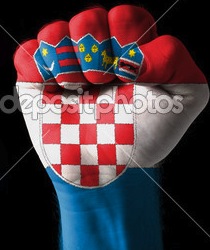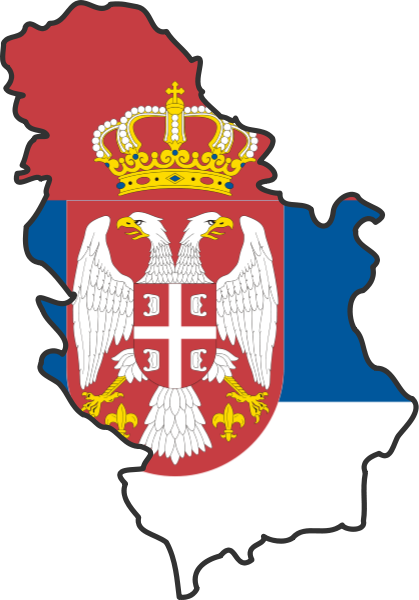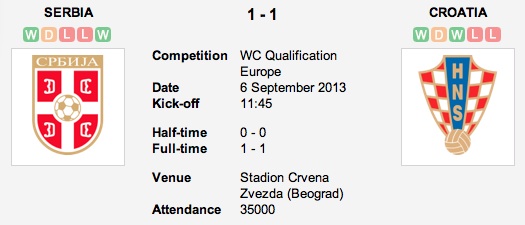 With all the Sturm und Drang surrounding the debate over bombing Syria, something happened last week that should have attracted a lot of attention but went almost completely unnoticed outside Eastern Europe. This past Friday, the Croatian and Serbian national teams played to a 1-1 draw in a World Cup qualifying match in Belgrade, Serbia. It wasn’t a particularly interesting or exciting game, except for the historical backdrop. Until relatively recently, the idea that a group of Croats could set foot in the Serbian capital without being brutally assaulted (or worse) was unthinkable. The war that followed the breakup of the former Yugoslavia pitted Croats against Serbs in a vicious conflict that more often than not gave no quarter and showed no mercy. When I worked in parts of the former Yugoslavia in the mid-90s, you would no more have seen a Croat in Belgrade than a Serb in Zagreb. I saw up close the brutality that had been wrought upon both sides in the name of nationalism; the hatred ran deep and forgiveness (or even tolerance) wasn’t even the remotest of possibilities.
With all the Sturm und Drang surrounding the debate over bombing Syria, something happened last week that should have attracted a lot of attention but went almost completely unnoticed outside Eastern Europe. This past Friday, the Croatian and Serbian national teams played to a 1-1 draw in a World Cup qualifying match in Belgrade, Serbia. It wasn’t a particularly interesting or exciting game, except for the historical backdrop. Until relatively recently, the idea that a group of Croats could set foot in the Serbian capital without being brutally assaulted (or worse) was unthinkable. The war that followed the breakup of the former Yugoslavia pitted Croats against Serbs in a vicious conflict that more often than not gave no quarter and showed no mercy. When I worked in parts of the former Yugoslavia in the mid-90s, you would no more have seen a Croat in Belgrade than a Serb in Zagreb. I saw up close the brutality that had been wrought upon both sides in the name of nationalism; the hatred ran deep and forgiveness (or even tolerance) wasn’t even the remotest of possibilities.
 Croats despised Serbs as Chetniks. Serbs despised Croats as Ustashe. If you walk the streets of Belgrade or Zagreb today, you’ll still hear those terms used with both frequency and venom. The historical hatreds that had been suppressed in Tito’s Yugoslavia were uncaged upon his death, and while the Serbs excelled in their brutality and inhumanity, Croats were also guilty of war crimes and crimes against humanity, some of which defy description or understanding. The international war crimes tribunal in the Hague is still, 20 years later, attempting to dispense justice for the atrocities committed during the war. Both sides have much to atone for, if atonement is even possible, but the fact that Croatia and Serbia could play a soccer game without bloodshed is testament to the healing power of sports.
Croats despised Serbs as Chetniks. Serbs despised Croats as Ustashe. If you walk the streets of Belgrade or Zagreb today, you’ll still hear those terms used with both frequency and venom. The historical hatreds that had been suppressed in Tito’s Yugoslavia were uncaged upon his death, and while the Serbs excelled in their brutality and inhumanity, Croats were also guilty of war crimes and crimes against humanity, some of which defy description or understanding. The international war crimes tribunal in the Hague is still, 20 years later, attempting to dispense justice for the atrocities committed during the war. Both sides have much to atone for, if atonement is even possible, but the fact that Croatia and Serbia could play a soccer game without bloodshed is testament to the healing power of sports.
Friday found 35,000 fans packed into the national stadium in Belgrade for an event that would have been impossible not so very long ago. It’s only the second time Croatia and Serbia have met on the pitch as independent countries (in March, Croatia beat Serbia 2-0 in Zagreb), and the fact that they were able to play a game unmarred by bloodshed and virulent nationalism is progress. I suspect it will be sometime before Serb families are vacationing in Dubrovnik, and it’ll be about as long before Croats are cruising the Danube River. It’s been said that every journey begins with a single step, and last week’s game in Belgrade is certainly that. It will be quite some time before either national team appears in the other’s capitol for a friendly match, but generation upon generation of hatred, mistrust, and murder aren’t going to be forgotten overnight. Still, if a Croatian soccer team can play in Belgrade and a Serbian team in Zagreb, then perhaps we can believe- or at least hope- that someday the epithets “Chetnik” and “Ustashe” will become a thing of the past.

